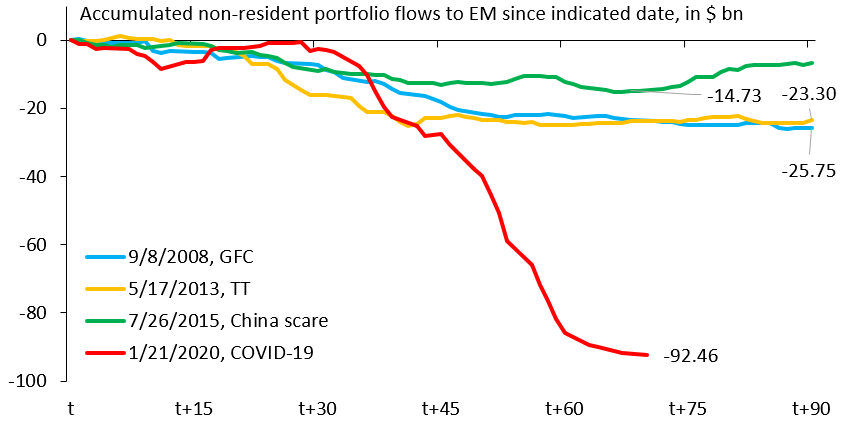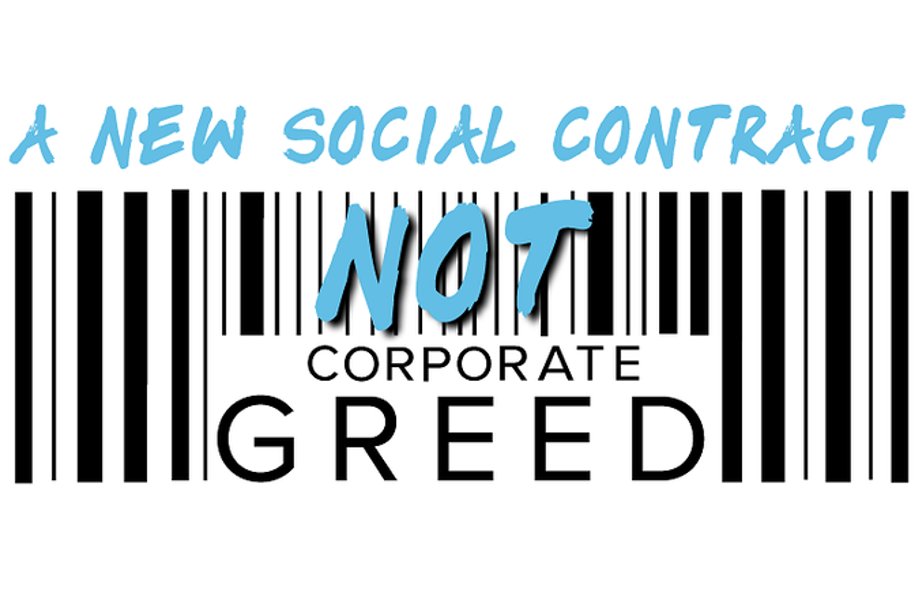THREAD: As shocks from COVID-19 ripple through the world, Global Unions  https://abs.twimg.com/emoji/v2/... draggable="false" alt="📣" title="Cheering megaphone" aria-label="Emoji: Cheering megaphone"> on @IMFnews, @WorldBank, governments to:
https://abs.twimg.com/emoji/v2/... draggable="false" alt="📣" title="Cheering megaphone" aria-label="Emoji: Cheering megaphone"> on @IMFnews, @WorldBank, governments to:
 https://abs.twimg.com/emoji/v2/... draggable="false" alt="⭕️" title="Heavy large circle" aria-label="Emoji: Heavy large circle">Bolster public health systems
https://abs.twimg.com/emoji/v2/... draggable="false" alt="⭕️" title="Heavy large circle" aria-label="Emoji: Heavy large circle">Bolster public health systems
 https://abs.twimg.com/emoji/v2/... draggable="false" alt="⭕️" title="Heavy large circle" aria-label="Emoji: Heavy large circle">Protect working people
https://abs.twimg.com/emoji/v2/... draggable="false" alt="⭕️" title="Heavy large circle" aria-label="Emoji: Heavy large circle">Protect working people
 https://abs.twimg.com/emoji/v2/... draggable="false" alt="⭕️" title="Heavy large circle" aria-label="Emoji: Heavy large circle">Support debt relief
https://abs.twimg.com/emoji/v2/... draggable="false" alt="⭕️" title="Heavy large circle" aria-label="Emoji: Heavy large circle">Support debt relief
 https://abs.twimg.com/emoji/v2/... draggable="false" alt="⭕️" title="Heavy large circle" aria-label="Emoji: Heavy large circle">Issue more IMF Special Drawing Rights
https://abs.twimg.com/emoji/v2/... draggable="false" alt="⭕️" title="Heavy large circle" aria-label="Emoji: Heavy large circle">Issue more IMF Special Drawing Rights
Full statement: https://www.ituc-csi.org/statement-spring-meetings-2020">https://www.ituc-csi.org/statement...
Full statement: https://www.ituc-csi.org/statement-spring-meetings-2020">https://www.ituc-csi.org/statement...
This is an unprecedented  https://abs.twimg.com/emoji/v2/... draggable="false" alt="🌏" title="Earth globe asia-australia" aria-label="Emoji: Earth globe asia-australia"> crisis: over 80 countries have already inquired about IMF assistance. Developing countries face additional pressure from a fall in commodity prices paired with capital flight of a magnitude not seen before.
https://abs.twimg.com/emoji/v2/... draggable="false" alt="🌏" title="Earth globe asia-australia" aria-label="Emoji: Earth globe asia-australia"> crisis: over 80 countries have already inquired about IMF assistance. Developing countries face additional pressure from a fall in commodity prices paired with capital flight of a magnitude not seen before.
These are some actions that are needed by @IMFNews and @WorldBank for a response to the crisis that reduces inequalities and lays the groundwork for stronger public health, social protection and labour market systems:
The G20 leaders committed to record a stimulus of $5 trillion. This is a welcome development but it needs to be put into action in a way that leaves no one behind, providing support to developing countries, the real economy, and jobs. https://www.ituc-csi.org/g20-summit-shows-global-leadership">https://www.ituc-csi.org/g20-summi...
To overcome this crisis, international assistance and cooperation are crucial. In a dollar dependent global economy, currently the US Federal Reserve is arbitrarily deciding what countries to support. The IMF should step up and provide support to all countries...
The IMF can provide all members with added liquidity, as it did in 2009, by issuing additional Special Drawing Rights (SDRs). SDRs are an international reserve asset the IMF has control over issuing. @KevinPGallagher, @JoseA_Ocampo, @UliVolz explain: https://www.brookings.edu/blog/future-development/2020/03/26/imf-special-drawing-rights-a-key-tool-for-attacking-a-covid-19-financial-fallout-in-developing-countries/">https://www.brookings.edu/blog/futu...
Additional liquidity is key for developing countries with large dollar debts that face record capital outflows that threaten their financial stability. @unctad calls for issuing $1 trillion worth of SDR  https://abs.twimg.com/emoji/v2/... draggable="false" alt="➕" title="Heavy plus sign" aria-label="Emoji: Heavy plus sign"> debt forgiveness and support for health systems. https://news.un.org/en/story/2020/03/1060612">https://news.un.org/en/story/...
https://abs.twimg.com/emoji/v2/... draggable="false" alt="➕" title="Heavy plus sign" aria-label="Emoji: Heavy plus sign"> debt forgiveness and support for health systems. https://news.un.org/en/story/2020/03/1060612">https://news.un.org/en/story/...
At @ceprdc, economists @ecuarauz and @MarkWeisbrot make an even bolder proposal and call for the G20 to support $3 trillion in new SDR allocations. https://cepr.net/press-release/g20-should-call-for-imf-to-issue-3-trillion-sdrs-cepr-economists-say/">https://cepr.net/press-rel...
And no genuine recovery can occur without debt forgiveness. Even before this crisis, some low-income countries spent more on debt service than health systems. Debt servicing should *not* cost lives. @eurodad @danielmunevar https://eurodad.org/covid19_debt1 ">https://eurodad.org/covid19_d...
The IMF has made it easier for some of its poorest members to be eligible for debt forgiveness on Fund loans. This should go much further and extend to more countries. @JubileeUSA @Eric_LeCompte https://www.jubileeusa.org/pr_covid_imf_letter_2020">https://www.jubileeusa.org/pr_covid_...
The IMF & World Bank called for bilateral creditors to suspend repayments from poor countries. A full-force debt relief process that includes all creditors, paired with a sovereign debt workout mechanism is still needed. https://eurodad.org/debt_moratorium_covid19">https://eurodad.org/debt_mora...
Working people are set to lose a lot in this crisis — up to $3.4 trillion in lost labour income, with up to 35 million people being pushed into working poverty. @ilo provides a framework for response based on int’l labour standards
https://www.ilo.org/wcmsp5/groups/public/---dgreports/---dcomm/documents/briefingnote/wcms_738753.pdf">https://www.ilo.org/wcmsp5/gr...
https://www.ilo.org/wcmsp5/groups/public/---dgreports/---dcomm/documents/briefingnote/wcms_738753.pdf">https://www.ilo.org/wcmsp5/gr...
The Jobs Pact adopted at the ILO after the last crisis provides a roadmap to recovery and is part of #SDG8. The IFIs should work with the ILO to finance and implement the Pact, keeping people out of poverty and creating jobs. #Timefor8
https://www.ilo.org/jobspact/lang--en/index.htm">https://www.ilo.org/jobspact/...
https://www.ilo.org/jobspact/lang--en/index.htm">https://www.ilo.org/jobspact/...
Global Unions welcome @IFC_org supporting borrowers in need. All beneficiary companies need to provide paid sick leave, and IFC must make sure they comply with labour safeguards on retrenchment, health and safety, and collective bargaining. https://www.ituc-csi.org/letter-to-the-international">https://www.ituc-csi.org/letter-to...
Along with health coverage, social protection is a frontline defense that needs scaling up and provision without barriers to informal and precarious workers. https://www.project-syndicate.org/commentary/covid19-vindicates-social-protection-systems-by-shahra-razavi-2020-03">https://www.project-syndicate.org/commentar...
For decades, the IMF and the World Bank promoted public sector cuts and market-based healthcare. This weakened the health systems of developing countries. We need public healthcare once and for all. @PSIglobalunion https://publicservices.international/resources/news/public-health-br-once-and-for-all-?id=10648&lang=en">https://publicservices.international/resources...
Frontline public health workers, especially in developing countries, need protective equipment and medical supplies to keep patients, and themselves, safe. This should be a priority of any World Bank and multilateral development bank response https://www.theguardian.com/world/2020/mar/18/colleagues-die-ebola-health-workers-coronavirus-martyrs">https://www.theguardian.com/world/202...
Education and care crises are deepening as well. During closures, we have to protect the jobs and incomes of teachers, bus drivers and many more. Investment in the care economy and education needs to be prioritized by IFIs in the recovery. @eduint https://issuu.com/educationinternational/docs/ei_guiding_principles_covid19_en?fr=sM2RhYjEwODIzMTg">https://issuu.com/education...
Essential workers are bravely keeping necessary services running, despite often being underpaid and precarious. This is an opportunity to transform society so that these workers have quality jobs. @itfglobalunion @uniglobalunion https://www.itfglobal.org/en/news/covid-19-urban-transport-workers-key-response-and-long-term-recovery">https://www.itfglobal.org/en/news/c...
It& #39;s also time to transform supply chains, starting with firms at the top. They need to take responsibility for their hidden workforces now facing mass layoffs. Recovery needs to strengthen worker bargaining power, raise wages and reemploy workers in decent jobs. @industriALL_GU
The IMF needs to play its role in ensuring the stability of the global financial system, support sustained stimulus measures and avoid mistakes made in previous crises when it pushed pro-cyclical #austerity policies onto countries and attacked collective bargaining.
Business as usual will not get us through the crisis or help us recover. Policies that drive deregulation and precarious work have no place in the response. World Bank Prez Malpass’ claims that structural reform will speed recovery, but it won’t.
The response to the crisis should be an opportunity for renewed cooperation in the international community. Multilateralism that values social dialogue and puts people and planet first is what we need. A pre-COVID19 vision of how to get there: https://www.opendemocracy.net/en/oureconomy/why-we-must-reform-the-imf-before-its-too-late/">https://www.opendemocracy.net/en/oureco...
And for more trade union responses on how to respond to this crisis in a way that puts working people and the planet first, @TUACOECD and @ituc are aggregating them here: https://tuac.org/news/covid19-crisis-mapping-out-trade-union-and-social-partners-responses/
https://tuac.org/news/covi... href=" https://www.ituc-csi.org/covid-19-responses">https://www.ituc-csi.org/covid-19-...

 Read on Twitter
Read on Twitter on @IMFnews, @WorldBank, governments to:https://abs.twimg.com/emoji/v2/... draggable="false" alt="⭕️" title="Heavy large circle" aria-label="Emoji: Heavy large circle">Bolster public health systems https://abs.twimg.com/emoji/v2/... draggable="false" alt="⭕️" title="Heavy large circle" aria-label="Emoji: Heavy large circle">Protect working peoplehttps://abs.twimg.com/emoji/v2/... draggable="false" alt="⭕️" title="Heavy large circle" aria-label="Emoji: Heavy large circle">Support debt reliefhttps://abs.twimg.com/emoji/v2/... draggable="false" alt="⭕️" title="Heavy large circle" aria-label="Emoji: Heavy large circle">Issue more IMF Special Drawing RightsFull statement: https://www.ituc-csi.org/statement..." title="THREAD: As shocks from COVID-19 ripple through the world, Global Unions https://abs.twimg.com/emoji/v2/... draggable="false" alt="📣" title="Cheering megaphone" aria-label="Emoji: Cheering megaphone"> on @IMFnews, @WorldBank, governments to:https://abs.twimg.com/emoji/v2/... draggable="false" alt="⭕️" title="Heavy large circle" aria-label="Emoji: Heavy large circle">Bolster public health systems https://abs.twimg.com/emoji/v2/... draggable="false" alt="⭕️" title="Heavy large circle" aria-label="Emoji: Heavy large circle">Protect working peoplehttps://abs.twimg.com/emoji/v2/... draggable="false" alt="⭕️" title="Heavy large circle" aria-label="Emoji: Heavy large circle">Support debt reliefhttps://abs.twimg.com/emoji/v2/... draggable="false" alt="⭕️" title="Heavy large circle" aria-label="Emoji: Heavy large circle">Issue more IMF Special Drawing RightsFull statement: https://www.ituc-csi.org/statement..." class="img-responsive" style="max-width:100%;"/>
on @IMFnews, @WorldBank, governments to:https://abs.twimg.com/emoji/v2/... draggable="false" alt="⭕️" title="Heavy large circle" aria-label="Emoji: Heavy large circle">Bolster public health systems https://abs.twimg.com/emoji/v2/... draggable="false" alt="⭕️" title="Heavy large circle" aria-label="Emoji: Heavy large circle">Protect working peoplehttps://abs.twimg.com/emoji/v2/... draggable="false" alt="⭕️" title="Heavy large circle" aria-label="Emoji: Heavy large circle">Support debt reliefhttps://abs.twimg.com/emoji/v2/... draggable="false" alt="⭕️" title="Heavy large circle" aria-label="Emoji: Heavy large circle">Issue more IMF Special Drawing RightsFull statement: https://www.ituc-csi.org/statement..." title="THREAD: As shocks from COVID-19 ripple through the world, Global Unions https://abs.twimg.com/emoji/v2/... draggable="false" alt="📣" title="Cheering megaphone" aria-label="Emoji: Cheering megaphone"> on @IMFnews, @WorldBank, governments to:https://abs.twimg.com/emoji/v2/... draggable="false" alt="⭕️" title="Heavy large circle" aria-label="Emoji: Heavy large circle">Bolster public health systems https://abs.twimg.com/emoji/v2/... draggable="false" alt="⭕️" title="Heavy large circle" aria-label="Emoji: Heavy large circle">Protect working peoplehttps://abs.twimg.com/emoji/v2/... draggable="false" alt="⭕️" title="Heavy large circle" aria-label="Emoji: Heavy large circle">Support debt reliefhttps://abs.twimg.com/emoji/v2/... draggable="false" alt="⭕️" title="Heavy large circle" aria-label="Emoji: Heavy large circle">Issue more IMF Special Drawing RightsFull statement: https://www.ituc-csi.org/statement..." class="img-responsive" style="max-width:100%;"/>
 crisis: over 80 countries have already inquired about IMF assistance. Developing countries face additional pressure from a fall in commodity prices paired with capital flight of a magnitude not seen before." title="This is an unprecedented https://abs.twimg.com/emoji/v2/... draggable="false" alt="🌏" title="Earth globe asia-australia" aria-label="Emoji: Earth globe asia-australia"> crisis: over 80 countries have already inquired about IMF assistance. Developing countries face additional pressure from a fall in commodity prices paired with capital flight of a magnitude not seen before." class="img-responsive" style="max-width:100%;"/>
crisis: over 80 countries have already inquired about IMF assistance. Developing countries face additional pressure from a fall in commodity prices paired with capital flight of a magnitude not seen before." title="This is an unprecedented https://abs.twimg.com/emoji/v2/... draggable="false" alt="🌏" title="Earth globe asia-australia" aria-label="Emoji: Earth globe asia-australia"> crisis: over 80 countries have already inquired about IMF assistance. Developing countries face additional pressure from a fall in commodity prices paired with capital flight of a magnitude not seen before." class="img-responsive" style="max-width:100%;"/>




 https://www.ituc-csi.org/covid-19-..." title="And for more trade union responses on how to respond to this crisis in a way that puts working people and the planet first, @TUACOECD and @ituc are aggregating them here: https://tuac.org/news/covi... href=" https://www.ituc-csi.org/covid-19-responses">https://www.ituc-csi.org/covid-19-..." class="img-responsive" style="max-width:100%;"/>
https://www.ituc-csi.org/covid-19-..." title="And for more trade union responses on how to respond to this crisis in a way that puts working people and the planet first, @TUACOECD and @ituc are aggregating them here: https://tuac.org/news/covi... href=" https://www.ituc-csi.org/covid-19-responses">https://www.ituc-csi.org/covid-19-..." class="img-responsive" style="max-width:100%;"/>


